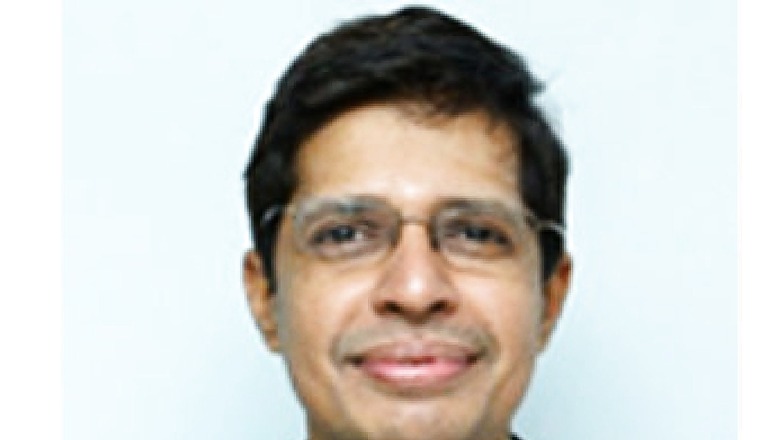
views
Whenever IIT Madras Director V Kamakoti lays back to rest awhile, his mind races back to the fields of Vishnupuram in Tamil Nadu’s Tiruvarur district. A farm boy at heart, Prof Kamakoti maintains the peculiarity of never having flown abroad for anything, preferring to “remain rooted” in India. At the helm of IIT Madras now, Kamakoti is driving investments into research, and working on special training programs for students who want to access the institute’s expertise through online courses.
Kamakoti, who is on the national security advisory board, had helmed a Government-instituted task force for artificial intelligence. In the coming months, Kamakoti would focus on driving investments into critical projects across industries, from electric vehicles to 5G technology, which has grown by 5-7 per cent year on year.
He also believes the spirit of entrepreneurship is vibrant in India, and that more students want to build their own companies than migrate to other countries in search of jobs.
Kamakoti was in discussion with News18’s Poornima Murali. Here are excerpts from the interview:
How do you plan to expand the industry-academia programme under your leadership? Can you broadly explain the structure of that department now, and how you plan to take it forward?
There are multiple ways through which IIT Madras associates with the Industry. The first is sponsored and consultancy projects, which have been seeing a steady growth over a period of time. It is expected to continue to grow at the same rate of 10% per year. We will be increasing the industry outreach by providing information about the various expertise available with the IIT Madras faculty, the type of problems they can resolve, and their interests. This will enable the Industry to engage IIT Madras Faculty as Consultants or through Sponsored Research projects.
Secondly, our web-enabled MTech program through which we re-skill people from the industry. This program has been successful and currently, we are offering around half a dozen such programs, wherein people from the industry can enroll and graduate. They can do the courses and projects as it happens in a full-fledged Mtech Program. The classes take place during the evenings.
Thirdly, we have a rich basket of patents. The Institute will be making details of these awarded patents and awarded innovations available to the industry so that people interested in licensing these can approach us and we would like to take the interactions further. In addition, IIT Madras is now going to have a systematic way of ‘An Idea to Start-up’ process. We have Nirmaan, which helps the student in polishing their creative ideas into something that is patentable and something on which any team can work and develop a prototype. Nirmaan also helps the students develop the prototype.
Our Target is to have 100s of start-ups incubated every year. All these start-ups would be looking up for customers. The industry can purchase the products developed by these start-ups; they can be funded too.
In Addition, the industries can set up their office at IIT Madras Research Park, which will provide them access to the IIT Madras faculty. Their staff can pursue Research Programs (MS/PhDs) in the Institute and they can also hire students from IIT Madras. A lot of things are possible when a large industry participates in this ecosystem.
Under Research at IIT Madras, which are the most happening segments of research. By that, I mean the sectors drawing a lot of attention from corporates who fund research and among scientists working on breakthroughs. Can you give us some examples of on-campus research powering new products in the market, across fields like EVs, Software, Civil Engineering, etc?
5G – IIT Madras, under a multi-institutional project, has been instrumental in getting a 5G Standard approved internationally. We will be doing a campus trial on 5G technology.
A successful IIT Madras-incubated start-up is Modulus Housing Company, which enabled the setting up of 1000s of oxygen beds in as short a time as a month during the COVID-19 pandemic.
Another exciting story is Agnikul, an IITM-incubated start-up which works on state-of-the-art technologies including 3D Printing for rocket engine manufacturing. It is getting ready to launch Low-Earth Orbit rockets, to start with, in the next couple of years.
We have interesting work happening on clean water, battery technologies, and state-of-the-art medical devices. Lots of research is also going on in the areas of road transport and safety. We also work closely with the different Ministries of the Government.
Another interesting project is the Hyperloop which, if successful, can enable Chennai-Bengaluru to travel in 35 minutes.
These are but a few of the areas in which exciting research is underway at IIT Madras.
As we spiral towards zero carbon emissions, research into green technologies is turning crucial. Can you give us a snapshot of the myriad initiatives at IIT Madras on EV research? If possible, please include significant breakthroughs in, say, battery tech to move the needle in this direction?
What India needs is low-cost and yet high quality.
Today most motors and controllers come from China and some from Germany. IITM is developing a series of high-efficiency Permanent Magnet Synchronous Motors (PMSM) and controllers for different vehicles. The motor and controller technology for e-rickshaw has already been transferred to a firm in Delhi, and one in Lucknow; production is expected to start production shortly. We today import a million such motors. Our motors/controllers are superior in quality and similar price as compared to Chinese. Motors for e-auto are under development and may be produced later this year. There is a plan to start converting all the existing old IC autos to EV autos. The objective will be to do the full conversion in about five years.
Battery packs in India need to operate at 48 degrees and withstand the vibrations of rough roads. The life of most imported battery packs gets cut to a third because of this. IITM has designed and developed battery packs, which can withstand the temperature and the rough roads and still last the full life. This will make EVs viable. The batteries will be produced this year.
Battery swapping was proposed by IITM about 5 years back. Initially, there was a lot of resistance from the regulators. However, IITM continued to work with industry, as it made great economic sense. This year, in the budget speec of FM, she has supported the battery swapping. All protocols for swapping were developed at IITM.
IITM is developing a variety of chargers and converters.
Investments in research at premier institutes such as IIT Madras are critical for actionable results. Can you give us a view of how investments into research at IIT Madras have increased over the years? How do you plan to garner more research funding for the institute?
The funding comes from both the Government, as sponsored research, and from the Industry through Consultancy. A significant amount of funding has come through CSR Grants, specifically for socially- relevant projects. All of these have been increasing steadily at 5%-7% a year, on average.
Lately, there have been certain large projects at IIT Madras funded by the Government. For example, the Technology Innovation Hub, under the National Mission of Inter-Disciplinary Cyber-Physical Systems, The Centre for Road Safety sponsored by the Union Ministry of Road Transport, and the Robert Bosch Centre for Data Science and Artificial Intelligence. (CSR Funding) are examples of large projects involving Government funding and participation by the industry.
Start-up partnerships: Has IIT Madras devised a structure to make it easier for start-ups to collaborate with IIT-M talent
The answer is absolute Yes. Start-ups can be incubated at IIT Madras using half-a-dozen incubators that are available. In addition, we also provide mentorship to start-ups through the Gopalakrishnan- Deshpande Centre for Innovation and Entrepreneurship (GDC). IIT Madras has also an Entrepreneurship Cell, which enables quick on-boarding of start-ups into the IIT Madras ecosystem.
Does IIT-M have plans to diversify its curriculum to align better with the economic business imperatives of our time?
IIT Madras constantly evolves its curriculum to meet the contemporary industry demands. In addition, IIT Madras has realized the importance of complete system building rather than piecemeal research. To enable students to have a holistic view of systems, IIT Madras currently offers 10 inter-disciplinary dual degree programmes, which would be of great interest to the Industry.
Research: How is IIT M planning to raise the profile of the institution as a Deep Tech Research destination?
IIT Madras has been recognized as an ‘Institute of Eminence’ (IoE). We would be starting at least 20 Centres working on contemporary technologies, solving research problems in those, leading to degrees for the students involved. The technologies addressed are niche and I believe, these will paint the next-gen research picture of IIT Madras.
As a tech institute, IIT M is at the centre of several innovations– how are we popularizing our knowledge base so that a wider section of the public is made aware of the innovation happening at IIT M?
One of the things is our Online BSc Program. Currently, the BSc Data Science Program is offered in which thousands of students have enrolled. In addition, the IIT Madras campus, IIT Madras Incubation Cell, and IIT Madras Research Park have many internship programs/competitions through which a large number of students can be benefitted.
There was much debate earlier about India’s tech prowess in flying to Western destinations… Is it happening even now? If so, how are you trying to address it?
The Trend now, especially post-COVID, is that many youngsters have a strong liking for entrepreneurship and they would rather be an employer than an employee. We are seeing an increasing trend of entrepreneurs staying in India rather than moving abroad for studies or jobs.
As Director of IIT M, how would you strive to improve cultural and ideological harmony at IIT Madras? Not just recently but over years, there have been developments that seemed to indicate there’s increasing ideological factionalism on campus bordering on rivalry. How would you attempt to bring out peaceful coexistence among these political/ideological factions?
The answer to this is transparency. The governance of this institute has always been transparent and would continue to be so. The governance structure of this institute would be inclusive and diverse, through which we hope to ensure peaceful co-existence.
We’ve heard you hold no visa from any foreign country and stay here in India. Tell us more
My village is my base. I might have moved to the town by my basic culture comes from my village, that is my fathers’ word. I stayed in my village for the first three years and I use to work in the fields. I learned how hard farming was. I use to return to my village during all school vacations and I have mapped the changes over the decades.
Read all the Latest Education News and Breaking News here















Comments
0 comment